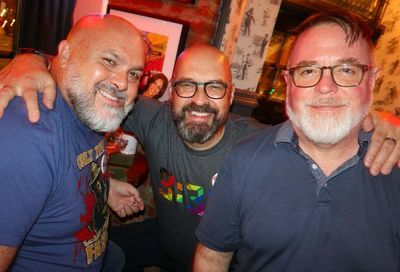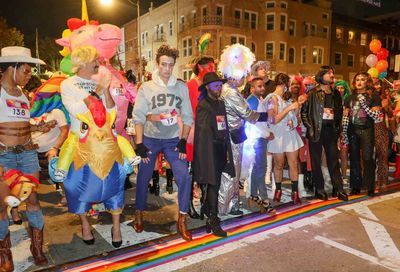All's Fair
Alphabet Soup
Over the weekend, our friend Linda boarded a plane en route to Iraq, decked out in her Army gear and ready to serve her country. She left, according to her husband, with a “positive, hopeful and proud spirit. ”
Back here on domestic soil, we’re positive, hopeful and proud of Linda too — and scared to death for her. Having a friend in the Army presents ethical and emotional challenges; we’re firmly anti-war in our household, and would rather not be glued to the television watching video of the night sky lighting up in Baghdad. Perhaps we’re overly idealistic, but we prefer to believe there’s a peaceful way to resolve things like this.
|
And it could probably go without saying here that the military is not what you’d call a gay-friendly employer and for that reason not particularly worthy of our support.
Regardless, a war is afoot. Linda and many others have been called to duty, and we could sit around griping about the president, griping about the war, griping about the sundry things that good Takoma Park liberals tend to gripe about these days. Admittedly, we do a bit of that. But we also spend time paying close attention to what’s going on — what helicopter went down, and where. What’s happening to the POWs, who is being tortured, who has been killed.
We’ve inched our way into that strange world of letters and numbers that describe a military division, paying close attention for any hint of detail about what Linda might be doing. I feel myself getting fiercely patriotic when I hear about sneaky Iraqi tactics — false surrenders followed by ambushes on U.S. troops, Iraqi fighters posing as journalists to inflict harm, for god’s sake.
“We should get them, ” I think then. We.
What happened when Linda told us that she would be deployed and then, a few weeks later, finally boarded that plane is that, after years of living the feminist adage that the personal is political, the political became personal. It’s not the first time the tables have turned on me that way, of course, but it is the first time I’ve felt so personally affected by a military action.
At that point, it became a war I had to be invested in, as more than a conscientious objector. I became forced to care about the strategies and setbacks and, like watching your high school classmate go on to excel on the college football field when you never cared about sports, I have been forced to root for the home team.
It’s not such an uncomfortable place, as it turns out, when I think of Linda and the thousands of others like her. They all have friends, they all have families. They’re doing their jobs with gusto. Regardless of what I think of the foreign policy tactics of George W. Bush, I have tremendous respect for and pride in the dedication required to put one’s life on the line with the goal of defending our constitutional liberties.
One thing helping us wrap our minds and our bleeding hearts around this matter is that Linda is a nurse in the Army, deployed as part of a hospital unit, so her mission is to save lives, not necessarily to take them.
Linda’s role in the war was a topic I unintentionally (or, perhaps subconsciously, intentionally) avoided a couple of weeks ago when I was in San Francisco, meeting with my old friend Tina, a labor union staffer whose politics have always managed to be firmly to the left of mine. I finally had a chance to meet Tina’s adorable two-year-old daughter, and brought Dolly a T-shirt from D.C. that had a big smiley face on it and lots of hearts and peace signs — perfect attire for the ongoing peace demonstrations in that city.
Dolly’s already been to a rally against the war, Tina told me — which is one more than I’ve attended. Tina and Dolly aren’t mentioning their activism to Dolly’s father, whom I’ve never met; he does not live with them and is mysteriously pro-war.
Tina’s about as liberal as anyone I know, and was the first person I came out to after I kissed a girl in college. I was inching my way out as a bisexual back then, and her response couldn’t have been more perfect: “Me too, ” she told me.
We’ve been friends since high school, when we bonded over our shared Kristina monikers and clicked in a way that was, at the time, a bit inexplicable. Later it became clear: We queers have a way of finding each other long before we know what we’re looking for.
Over the years, we’ve stayed in touch, sometimes letting a year or two lapse before we reconnect and I remember all over again how and why I love my friendship with her. Our lives have taken somewhat divergent paths and at times she’s made me feel like the most traditional person in the world — and at other times I am struck by how much we’ve always had in common and always will. During this recent visit, when she talked about how she almost married Dolly’s father and was planning to take his last name, it was the first time in a long time that she made me feel like a left-wing radical.
Tina has turned out to be a great mother, literally holding the future in her hands, and sitting through lunch with Dolly or spending time thinking about any of the other young people who enrich my life, I’m reminded of why I hate the idea of war. Somewhere in Iraq there’s a little girl who’s as adorable as Dolly, with every bit as much of a right to live, who may get caught in the wrong place at the wrong time, who may get hurt or killed.
Then again, maybe my brave and skilled friend Linda and her coworkers will save such a little girl’s life. If there’s anything this war has taught me, it’s that nothing is black and white, and somewhere in the many shades of gray are all the characters who make our lives complete.
Kristina Campbell’s neighborhood is peppered with “War is not the answer ” signs and bumperstickers, but no signs or stickers that say what the answer is. Her column appears biweekly, and she can be reached at kcampbell@metroweekly.com.
Support Metro Weekly’s Journalism
These are challenging times for news organizations. And yet it’s crucial we stay active and provide vital resources and information to both our local readers and the world. So won’t you please take a moment and consider supporting Metro Weekly with a membership? For as little as $5 a month, you can help ensure Metro Weekly magazine and MetroWeekly.com remain free, viable resources as we provide the best, most diverse, culturally-resonant LGBTQ coverage in both the D.C. region and around the world. Memberships come with exclusive perks and discounts, your own personal digital delivery of each week’s magazine (and an archive), access to our Member's Lounge when it launches this fall, and exclusive members-only items like Metro Weekly Membership Mugs and Tote Bags! Check out all our membership levels here and please join us today!



















